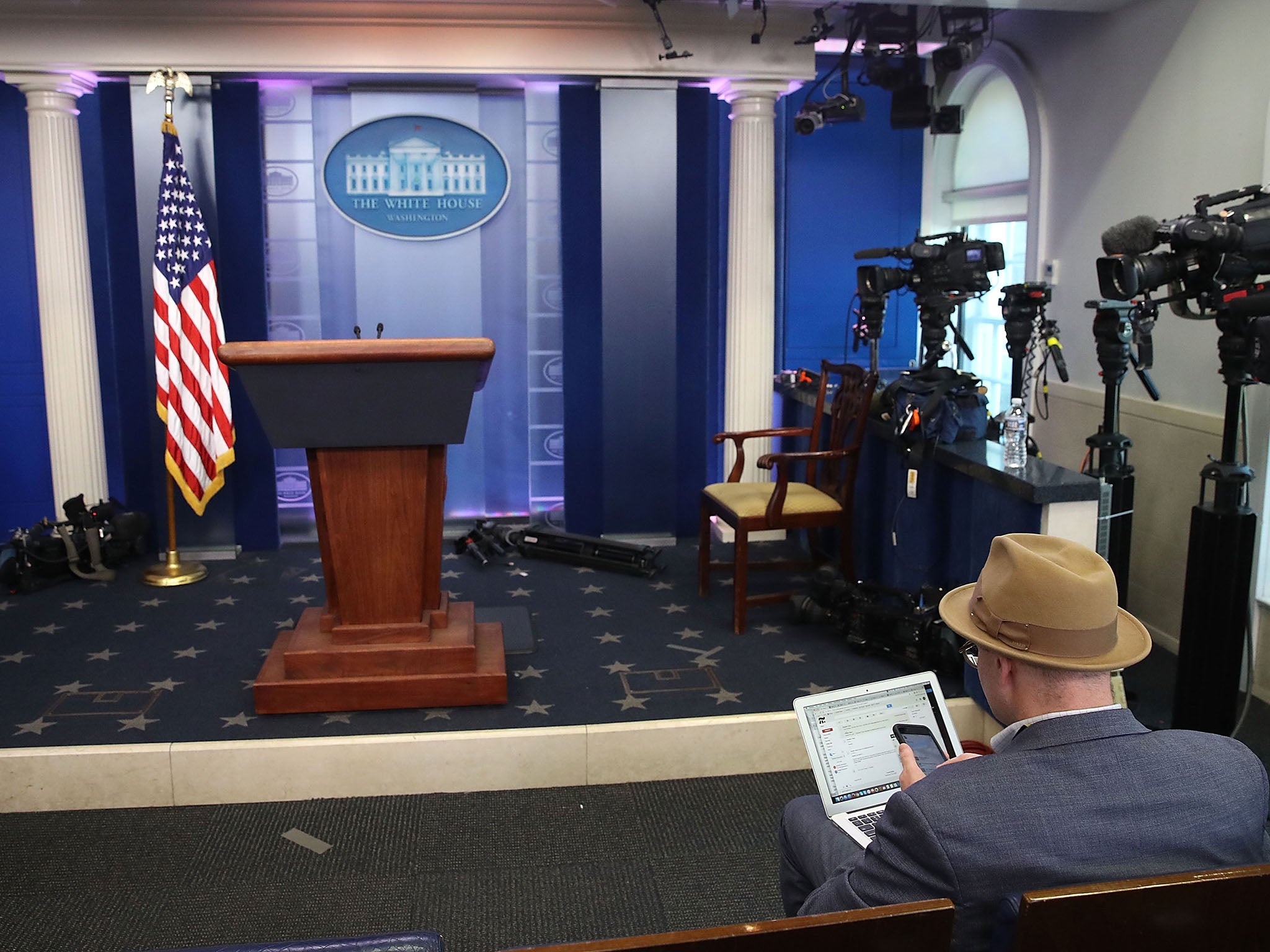US and world media organisations must unite against Donald Trump's attempt to divide them
For British journalists, the openness and disorder of White House press briefings, which are not only on the record but televised, have always been something of a model to which to aspire. It is a backwards step, therefore, for Mr Spicer to hold a briefing off camera and with representatives of only selected media organisations

Your support helps us to tell the story
From reproductive rights to climate change to Big Tech, The Independent is on the ground when the story is developing. Whether it's investigating the financials of Elon Musk's pro-Trump PAC or producing our latest documentary, 'The A Word', which shines a light on the American women fighting for reproductive rights, we know how important it is to parse out the facts from the messaging.
At such a critical moment in US history, we need reporters on the ground. Your donation allows us to keep sending journalists to speak to both sides of the story.
The Independent is trusted by Americans across the entire political spectrum. And unlike many other quality news outlets, we choose not to lock Americans out of our reporting and analysis with paywalls. We believe quality journalism should be available to everyone, paid for by those who can afford it.
Your support makes all the difference.The decision of Sean Spicer, the White House spokesman, to exclude selected media organisations from his briefing on Friday is another sinister misstep by the Trump administration.
Donald Trump’s paranoid war against the media, parts of which he has called “the enemies of the people” – a description he repeated on Thursday – is an alarming aspect of the US President’s tendency to authoritarianism. The idea of a closed cabal of approved outlets being given privileged access to government is not necessarily a harbinger of totalitarianism, although it has those overtones, but it should be resisted in any case because it is bad for the health of democracy.
The Independent in its early years fought a campaign against the secrecy and exclusivity of the British lobby system. Our journalists boycotted lobby briefings, by which the Prime Minister’s spokesman spoke to parliamentary reporters on unattributable and deniable terms. Since then, the briefings have been put on the record and the number of journalists entitled to attend – and indeed to have access to the Members’ Lobby of the House of Commons – has been expanded.
For British journalists, the openness and disorder of White House press briefings, which are not only on the record but televised, have always been something of a model to which to aspire. It is a backwards step, therefore, for Mr Spicer to hold a briefing off camera and with representatives of only selected media organisations.
Invited to his West Wing office were Breitbart News (founded by Steve Bannon, President Trump’s chief strategist), One America News Network, The Washington Times, ABC, CBS, NBC, Fox News, Reuters, Bloomberg and The Wall Street Journal. Out on the naughty step were CNN, BBC, The New York Times, LA Times, New York Daily News, BuzzFeed, The Hill, and the Daily Mail – the first three of which have been named disapprovingly by the President. They were joined by Associated Press and Time magazine, who refused to attend a selective briefing, and would have been joined by The Wall Street Journal if its reporter had known about the exclusions.
We praise the Associated Press, Time and The Wall Street Journal for protesting instantly against it, but expect that their boycott will be the start of a wider revolt. Mr Spicer’s attempt to divide and rule will only backfire against President Trump. It is almost calculated to unite most journalists, editors and proprietors against him.
Supporters of the President are entitled to point out that Barack Obama’s administration tried to exclude Fox News, the conservative broadcaster owned by Rupert Murdoch, from its briefings – and that Fox News did not enjoy much solidarity from other news organisations in its fight for access. But by dividing the media into two such large blocs, Mr Spicer is asking for trouble.
President Trump has not suffered by picking fights with powerful media organisations so far. And it will be no surprise if the Hollywood branch of the media industry maintains the assault on him in the Oscar acceptance speeches tomorrow night.
But Mr Spicer’s attempt to give selected organisations privileged access to the Trump administration is simultaneously menacing, faintly ridiculous and almost certainly counter-productive. Journalists for American and global news organisations must not accept it. They must not be intimidated by it; they must make fun of it; and they must unite against it. Even President Trump must recognise that such a battle is not in his interest.
Join our commenting forum
Join thought-provoking conversations, follow other Independent readers and see their replies
Comments